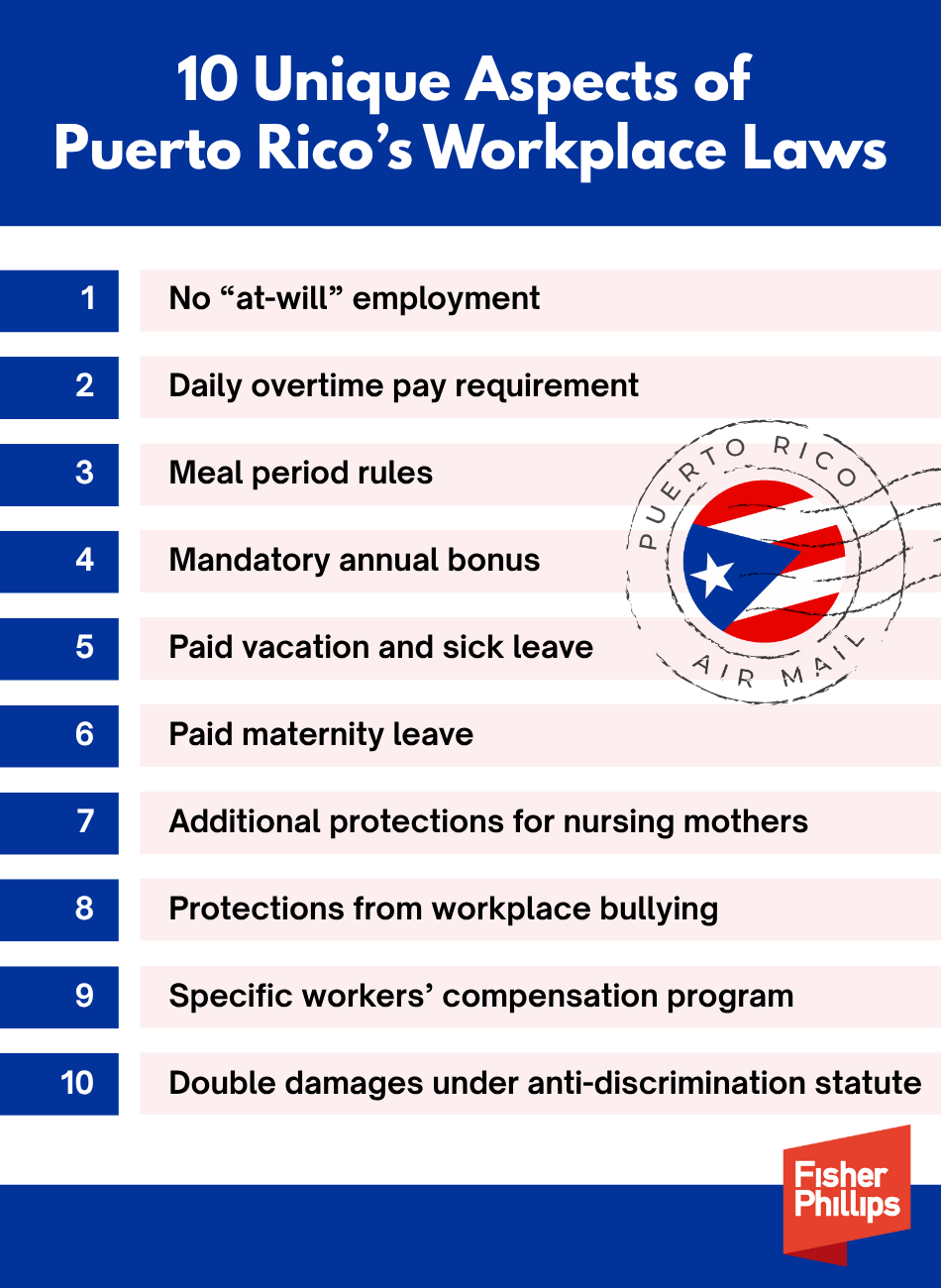Doing Business in Puerto Rico: Top 10 Things Employers Need to Know About the Island’s Workplace Laws
Insights
8.06.25
Vacationers are flocking to Puerto Rico this summer to see the island’s superstar reggaeton singer perform, and the potential economic boost is capturing the attention of many businesses. Whether your business is already established or looking to expand operations in Puerto Rico, understanding how its labor and employment laws differ from those of a US state is crucial. As Bad Bunny’s residency puts Puerto Rico in the spotlight, we’re highlighting the top 10 labor and employment laws every business should understand.
|
Want to keep up with the latest workplace law developments in Puerto Rico? You can subscribe to receive Puerto Rico Insights here. |

Unique Labor and Employment Landscape
Labor and employment laws in Puerto Rico differ from those in US states due to Puerto Rico's unique status as a US territory and its distinct legal framework. Many federal laws apply to Puerto Rico workplaces, including the Fair Labor Standards Act (FLSA), the National Labor Relations Act (NLRA), Title VII of the Civil Rights Act, and the Americans with Disabilities Act (ADA). But Puerto Rico has also enacted its own labor laws that provide additional protections and regulations for employees. Here are some key differences employers should note:
1. No “at-will” employment: In most US states, employers and employees alike can end the employment relationship without cause or notice, unless certain exceptions apply. Employment in Puerto Rico, however, is not “at-will.” Puerto Rico's wrongful discharge law requires employers to pay severance (mesada) to employees who are terminated without "just cause," as defined by law – and the severance amount is determined by statute.
2. Additional overtime pay requirement: Puerto Rico's laws define “overtime” as hours worked beyond eight in a day or 40 in a week, requiring payment at 1.5 times the regular rate. While some US states have daily overtime requirements, the federal FLSA applies only to weekly overtime.
3. Meal period rules: Nonexempt employees are entitled to a meal period of at least an hour for every workday that exceeds six consecutive hours. By written agreement, this period may be reduced to no less than 30 minutes.
4. Mandatory annual bonus: Puerto Rico's labor laws mandate an annual bonus (known as the Christmas Bonus) for employees who meet certain work-hour thresholds, with varying percentages based on the employer's size and the employee's tenure.
5. Paid vacation and sick leave: Nonexempt employees accrue vacation leave if they work at least 130 hours per month, with rates varying based on the employer's size and years of service. Sick leave accrues at a rate of one day per month for those working at least 130 hours, regardless of employer size.
6. Paid maternity leave: The Working Mothers Protection Act provides eight weeks of fully paid maternity leave to working mothers.
7. Additional protections for nursing mothers: Nursing employees may take paid breaks for breastfeeding or pumping – and employers, supervisors, and their representatives are prohibited from taking adverse action against employees for taking such breaks.
8. Protections from workplace bullying: Puerto Rico law prohibits workplace bullying and abusive conduct and requires employers to have protocols for reporting and investigating such behavior.
9. Specific workers’ compensation program: The State Insurance Fund (SIF) is a public corporation that issues policies and administers benefits under Puerto Rico’s workers’ compensation law (Law 45). Every employer must secure insurance to cover employees’ work-related accidents or illnesses.
10. Double damages under anti-discrimination statute: Law 100 is Puerto Rico’s general anti-discrimination statute. Besides covering all categories protected by Title VII, it also covers political affiliation, political beliefs, being or being perceived as a victim of domestic violence, and veteran status, among other categories. Employees can seek double damages for violations under this law.
These are just some examples of the many diverse labor and employment laws governing Puerto Rico’s workplaces, highlighting the island's distinct legal, cultural, and economic landscape.
|
Want to keep up with the latest workplace law developments in Puerto Rico? You can subscribe to receive Puerto Rico Insights here. |
Conclusion
If you have any questions about Puerto Rico’s labor and employment laws, please contact your Fisher Phillips attorney or the author of this insight. Make sure you are subscribed to the Fisher Phillips Insight System to get the most up-to-date information.
